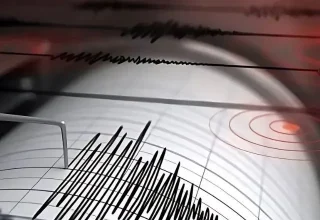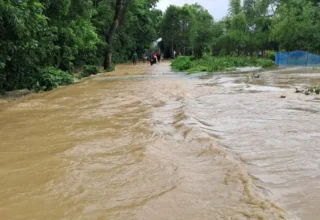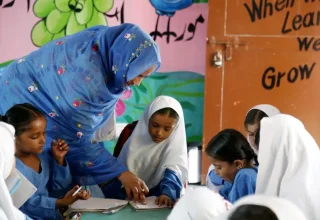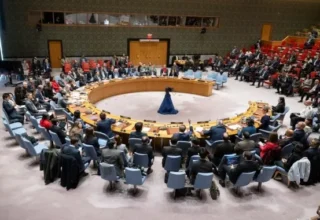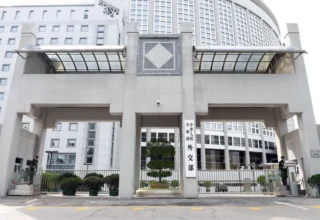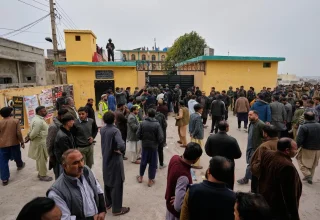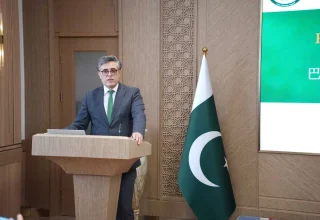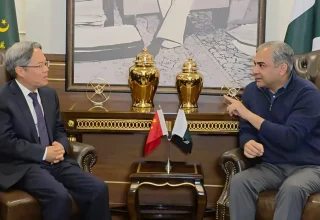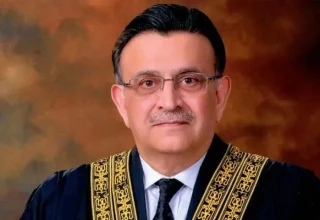
Chief Justice of Pakistan Umar Ata Bandial on Friday during the hearing of petitions challenging the government’s decision to conduct trials of civilians in military courts of civilians remarked that the top court will intervene if a martial law-like situation emerges.
A six-member bench of the SC headed by Chief Justice of Pakistan Umar Ata Bandial is hearing multiple petitions against the trial of civilians in military courts.
The bench also includes Justice Ijazul Ahsan, Justice Muneeb Akhtar, Justice Yahya Afridi, Justice Syed Mazahar Ali Akbar Naqvi and Justice Ayesha Malik.
Today’s hearing
During today’s hearing, Attorney General of Pakistan (AGP) Mansoor Usman Awan presented crucial evidence related to the case.
He asserted that photographic evidence clearly established the identities of those involved in a particular attack on May 9.
Following the incident, only 102 individuals were arrested, with utmost care exercised in their apprehension.
AGP Mansoor Usman Awan emphatically stated, “What transpired on May 9 was an unprecedented event in our history, and it must never be allowed to repeat in the future.”
As the court sought clarity on the procedure for detaining individuals in military custody, the Attorney General explained that utmost care was taken in the selection of individuals for military trial.
He emphasized that under the Army Act, the trial of civilians could not take place for civil crimes committed by them.
The amendment made to the Army Act in 2015 clearly included provisions for the trial of civilians.
Chief Justice Umar Ata Bandial directed the Attorney General to refer to Section 2 of the Army Act, which pertains to the trial of civilians.
AGP Awan explained that according to this section, if a civilian interferes with defense matters, they fall within the jurisdiction of military courts.
The court further explored the issue of deteriorating discipline within the armed forces. The Attorney General clarified that such matters are enshrined in the Army Act, reaffirming the relevance of this legal framework.
During the proceedings, an essential point of contention arose when Justice Yahya Afridi questioned whether the Army Act violated basic human rights.
The AGP categorically stated that the Army Act did not infringe upon fundamental human rights.
Justice Muneeb Akhtar raised concerns about fundamental rights and inquired if Parliament had the power to amend the Army Act. The Attorney General confirmed that Parliament indeed had the authority to amend the Act.
Justice Ayesha Malik drew attention to the significance of the 21st Constitutional Amendment in safeguarding the independence of the judiciary.
“You can’t compare the present era with the era of Ziaul Haq. This is not Ziaul Haq’s era nor is martial law imposed in the country. Even if a martial law-like situation arises, we will intervene,” CJP Bandial said.
Chief Justice Umar Ata Bandial stressed that fundamental rights could only be abolished through legislation. He emphasized that the independence of the judiciary holds a central position in Pakistan’s legal system and is constitutionally recognized as a fundamental right.
The proceedings were briefly disrupted due to heavy rainfall, but they resumed after the weather cleared.
Justice Syed Mazahar Ali Akbar Naqvi asked whether the accused had been kept in cells or rooms. The Attorney General responded that the accused have been kept in jail, but they are not treated like terrorists.
He reassured that all arrested individuals have been provided with all necessary facilities.
The CJP remarked that any actions, in this case, would require legislation. As per his understanding, the trial has not yet commenced, and the investigation is currently underway.
The court will be informed before any military trial begins, emphasizing that no trial will be initiated without proper evidence. Furthermore, the trial will be conducted openly in the court.
As the hearing concluded, the Attorney General assured the Supreme Court that detailed reasons for the trial decisions of the military courts on the May 9 incidents would be provided.
The bench adjourned the session, keeping in mind the significant legal and constitutional implications of the case.
In a recent development, AGP Awan has assured that the accused will have the opportunity for legal representation, with the possibility of seeking services from a private counsel. He emphasized that Section 133 of the Army Act enables the appeal of military court verdicts.
“If the punishment exceeds three months, an appeal can be made within 42 days,” the Attorney General explained, stating that the plea could be filed in a court of appeal.
Regarding the events of May 9, Awan clarified that the Pakistan Army is currently investigating the matter, and no trials of the accused in military courts have commenced thus far.
On the crucial issue of the right to appeal, the AGP requested additional time for careful consideration. He stressed the importance of handling the matter in a manner that safeguards the country’s position, drawing attention to the case of Indian spy Kulbhushan Yadav.
In light of the complexity of the matter, AGP Awan sought a one-month extension from the Supreme Court, leading to an indefinite adjournment of the hearing.















